Comics an' Me. A love story. (Part 1)

I like comics.
I mean I really like comics. I've got a kind of visceral, primal attraction to the smell of musty newsprint an' glossy covers. I can sit for hours rubbing my hand up and down the covers of my comics going... "ooooh. Shiny."
Therefore: When I'm Grand High Dictator of the Universe (Target Date: June 14, 2007) I'm going to "ask" my help-slaves to build me a giant comics bin, like Scrooge McDuck's Money bin, where I can swim and burrow through yellowing copies of Rom: Spaceknight and Krona, Monarch of Monster Isle.
In general, I like comics better than books.
I like comics better than movies, or TV...
Or Tooth-pick sculpture, or dioramas made from dead bodies.
I don't ignore the fact that, the majority of comics are aimed at a juvenile audience, and I that my 21st birthday is far in the past.
I don't deny that comics are cheaply produced, and that the system that's set up to produce them can be downright exploitative of the creative talent.
I don't deny that, at ANY given time in the history of the art form, some of those self-same creative folks have been pumping out uninspired hackwork while dreaming of a better job in advertising or in the movies.
Still, despite all these negatives, I mmmmmmLOVE comics, more than older, more developed, popular, or refined artistic media.
So, as an introductory-type post, I thought I'd list eight reasons for my comic-lust.
Four now, and four...uh... when I get around to it.
1. The Comics Page
Having given this AT LEAST seven minutes of thought, I've decided that the comics page is the most versatile of all storytelling mediums.
Certainly one of the best values.
Heck, ONE painting can easily set you back ten thousand bucks. With comics you can get eighty small paintings (give or take) for two bucks fifty (give or take.)
The panels on the Comics page can be rearranged and twisted in ways that TV and Movies can't... And when they try, the end result is...
Timecode.
*Shudder*
When movies and TV TRY to do comic-y things, they fail miserably.
Only in comics can the artist use panel placement to lead the eye
d
o
w
n
and then
accccccccccccccrrrrrrrrooooooossssssssssssss
the page, making each page a totally different canvas, using the ability to move in different directions to change the storytelling flow...
Only on the comics page do you have beats, where a bunch of small, relatively unimportant filler panels...

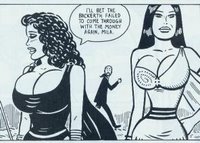
Can be followed by one
REALLLY
BIG
Panel,
Which Show You What's REALLY Important.

(The size differential was bigger in the original comic. I am a near-computer illiterate lost little urchin, and this was the best I could do with Blogger.)
Only in comics can you "layer" one set of art on top of another, either for atmospheric effect, or
use layering to establish setting, like in this here half page....

This might be a little tough to make out, what with Blogger being a tremendous stinky pile of suck and all, so here's a blow-up.
And then there's filmic "pan in "effects done in such a way that they wouldn't really work in film, like this, here...
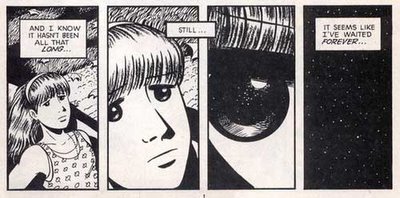
As JB the Infobroker (Who originally posted these panels on the Comic Book Resources forums as part of the " Classic Comics Twelve Days of Christmas" put it...
"
I admit I am a sucker for truck-in (and truck-out) panels. They are so effective when they pace to the words. Add to that the masterful composition, so well balanced, which pulls you smoothly towards the central subject of the story.
There is so much mood being expressed in these four time-brief panels. It's amazing that so few lines can express so much. It's a classic example of less is more."
Really, the purpose of art is to make contact with your audience.
But where else can you do this literally?
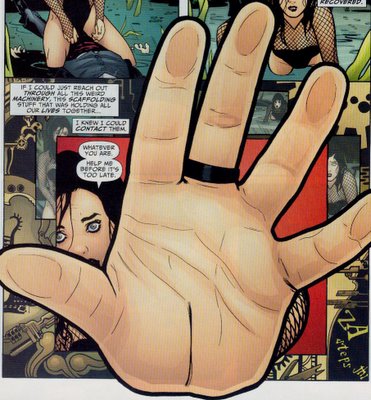
But, in the end, the attraction of the comics page to me is seeing the variety of ways a bunch of separate, creative minds can all accomplish what is, essentially, the same task...
Fill a blank piece of paper.
2. Mass Production
Comics are all about speed.
Nah, I'm not talking about those free "Spider-man FIGHTS MISTER DRUGS" promo comics from the eighties.
Smart-ass.
What I mean is that comic professionals are constantly, hectically, even heroically, rushing to fight off the oncoming monthly deadline, tryin' to consistently keep comix product in our hot l'il hands. If there's one think that Mark Evanier's taught me it's that being a fast comic book artist is just as important as being a GOOD comic book artist.
Which means that yer average mainstream comic book is not anywhere near as polished a final product as, say, and your basic Hollywood Movie or a book by a major author.
And, you-betcha, I call this a good thing.
The SPEED with which comics have to be produced gives 'em a feeling of urgency. Both the audience and author are barreling through the material at breakneck speed... WE don't know what's gonna happen next... And neither, necessarily, does the writer.
Deadlines!
Gotta make Deadlines!
More text! More Pages! Gotta Fill Space!
Faster!
We (the audience) and the writer share the suspense. :)
There's something very... shoot, I dunno... pure, maybe? about writing (or drawing) in the pulp fiction tradition. You've got a deadline, son! So every stray thought has to make it on the page. Comic writing and drawing are more id-driven and less logic driven than other forms of writing... The process has to happen almost by instinct to meet the deadlines.
One of the most interesting results of this is the lack of a "sure thing" in comics. Even the most incompetent of hack writers can poop out a pure, sparklin', diamond of a story every now and again....
But, likewise, even the most engaging artists can get assigned a book with only a week to do the job, and...
Most important to me, the creators don't always have time to wait for brilliant creative inspiration to strike. Which leads to the kind of whack-a-ding-dong B-I-Z-Z-A-R-E creations as the Metal Men, or the Space Canine Patrol Agents, or Lord LaZee, the World's Laziest Supervillain.
I believe that, had the creators of the aforementioned characters (An' I'm not going to name names) had time to revise their creative process, well,
(A) The End Results would have been a heck of a lot less... how shall I put this... demonstratably psychotic, and
(B) The world would, in a small but significant way, be a lesser place. Or at least a less strange place, which is pretty much the same thing in my eyes.
Deadlines!
Gotta make Deadlines!
More Text! More Pages! Gotta Fill Space!
Faster!
ANOTHER result of this constant need for speed is the possibility of, well,...
this.
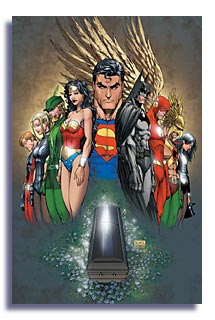
*Snicker*
Look again.
That coffin... is located where you would normally find Superman's, er, miniature Superman.
Now if Mike Turner had had three months to revise his masterpiece, d'you think he wouldn't have caught this?
And isn't the final product vastly more entertaining since he didn't?
Which isn't to say that ALL comics are as dirty as the above, or even as dirty as Frederick Wertham (We'll get to him later on) made 'em out to be. But there's a from-the-id quality that comes from having to work the constant, monthly, grind that denies repression.
Of course, TV operates under similar creative restrictions, but the fact that comics are produced by a much smaller pool of creators means that comics have a sense of individualism, and of absolute goofiness which would almost certainly be eliminated if the creators were forced to actually verbalize their ideas in front of other actual adult-types.
Comics, on the other paw, bring a flying-by-the-seat-of-your-pant, anything-goes, oh-shit-I-accidentally-drew-a-dirty-picture-and I-don't-have-time-to-fix-it and I-hope-my-editor-doesn't-catch-it-so-I-don't-have-to-draw-it-again vibe....
Which, if nothing else, keeps 'em from getting boring.
# 3 Commerciality
We are all mature comics fans here.
Let us not mince words.
Comics are about pandering. The deciding factor for continued publication of a title is "Is this puppy making us money?" with "Is this comic creatively worth a damn" a very, very distant second.
The kids like Romances this week? Let's turn all our superhero books from "Moon Girl" to "A Moon, A Girl, Romance." The kids digging a certain hairy, mutant midget? Let's guest star him in every. damn. comic. we publish. (*Sigh*) If the publishers notice that slapping a shiny cover means that you'll sell more books to collectors arbitrarily decided that any comic with a glow in the dark cover will be worth a small fortune in the next couple years, well, you can be sure that every comic from Action Comics to Zorro's going to give off a sickly, radioactive glow come nighttime.
And WOOO-HOOO! This is COOL!
It boils down to good old, American honesty. Art, in any sort of commercial society, has always been driven by money, if the artist in question has any intention of eating on a semi-regular basis.
Remember, folks, Michelangelo worked on commission.
The strength of comics is that they're much less likely to try to disguise their essentially capitalistic nature behind the veil of "artistic merit."
Which doesn't mean comics don't or can't HAVE artistic merit. And Always have, with Krazy Kat and the Spirit being the strongest examples from the young medium.
I think this is cool for two reasons:
(1) As a fan of not just comics but also the history of comics (I like reading about old Jewish Dudes) and sociological effects of comics, it's completely fascinating to see the efforts of a bunch of middle aged Jewish guys to produce product that taps the youth culture zeitgeist, and
(2) Old comics. As we've established above, comics are written fast. This means that the current thoughts of comic authors have to make it on the printed page. Combine this with the fact that comics publishers will embrace any trend in the pursuit of moolah, means that comic books serve as a cultural and historical record of the times they were published in. It's the combination of writers writing about the immediate concerns of their lives, and publishers desperately trying to cop to the latest trend, that anchor comics to one time and place.
Comics, being profit driven, have never tried for timelessness the way literature or even movies do.
Which means that each comic is an individual artifact of a by-gone era. (Or a current era.)
And, honestly, I like history better when it has Giant Dinosaur Octopuses with Laser Guns in it.
# 4. Morality.
Since their inception, comics have tried to impart moral lessons on their audience. Superhero stories are, at their core, moral fables, where bravery, nobility, and lawfulness

consistently triumph over lawlessness and evil. Or, if you prefer, "evil."


Likewise, most other major genres of comics, from Westerns to Romance to Kid's Stories show our virtuous heroes surviving and if not prospering...
Then at least doin' better than their enemies, who, virtually without exception, end up killed or imprisoned or, at the VERY least, spanked.
Superheroes teach us that "Great Power Comes From Great Repsonsibility" that we should believe in "Truth, Justice, and the American Way."
More than any other medium, comic writers feel a moral obligation to their audience.
Of course, there are those folks who have felt that comics WEREN'T so moral. Waaaaay back in the fifties a public outcry, sparked by Frederick Wertham's scientifically dubious book "Seduction of the Innocent," accused comics, especially the gory, horrific EC comics of the time, of actually promoting crime amongst the younger set,
loudly promulgating the view that because these comics contained criminals committing criminal acts, the children who read them would commit criminal acts.
Therefore completely missing the point of the EC Line.
If you kill someone in an EC Horror Comic...
Zombies EAT yo' ass.
If you STEAL, in an EC Horror Comic.....
Zomhies EAT yo' ass.
If you commit adultery in an EC Comic...
There's a zombie, somewhere, firing up the grill and putting on his "Kiss the Cook" bib.
In truth, EC comics were just as, if not MORE, scrupulously moral than any other companies comics, and certainly more moral than the rest of the popular media of the day.
And, even in today's mainstream comics, while not so focused on the penalties of criminal acts (Generally decaptitaion and defenstration, usually by zombies) the vast majority of protaganists serve as moral guideposts.
Growing up as an only child with no big brothers or sisters to mold my behavior after (Which might've been a HUGE mistake, knowin' some of the big brothers and sisters I know...)
I looked to comic book heroes for moral guidance.
Should I pull Susie's hair? What would Captain America do?
Should I eat this delicious paste? What would Spider-man do?
Should I throw a snowball at the retarded kid and make him cry? Better now. Batgirll would be pissed!
It was kinda like the comic creators of the time were grabbin' me firmly by the hand and saying "Hey. Kid. Y'should Do the Right Thing, y'know? And stuff'll work out for you. Eventually.
.
.
.
Or AT LEAST you won't end up speaking in the third person with a red-hot mask permanently attached to your noggin."
It was infinitely reassuring to l'il pre-teen MarkAndrew to see Good come along, and consistently give Evil a good kick in the heinie.
And, heck, it's kinda reassuring Now.
Art Credits:
1. Carl Barks, Watercolor, for The Life and Times of Scrooge Mcduck.
2. 3 Panels from Gilbert Hernandez, from Love and Rockets, 2cd series, # 15.
3. Panels from Daredevil: The Man Without Fear, Pencil Art by John Romita Jr.
4. Panels from Zot # 11, by Scott Mccloud.
5. Panel from Zatanna # 4 (2004 Series) Penciled by Ryan Sook. (And, oh yeah. SPOILERS.)
6. Cover from Identity Crisis # 1 by Michael Turner.
7. Unknown.
8. Editorial Cartoon by Pat Olliphant.
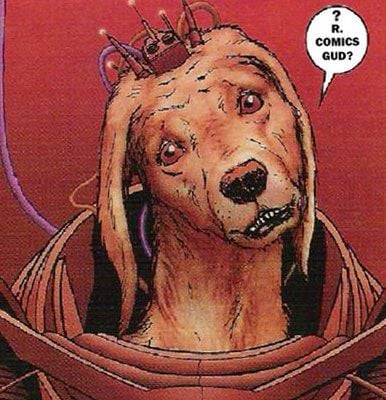


2 Comments:
.... I thought this was going to an article about Uncle Scrooge.... that's false advertising!
Brian!!
Pssst.
It's foreshadowing.
Post a Comment
<< Home